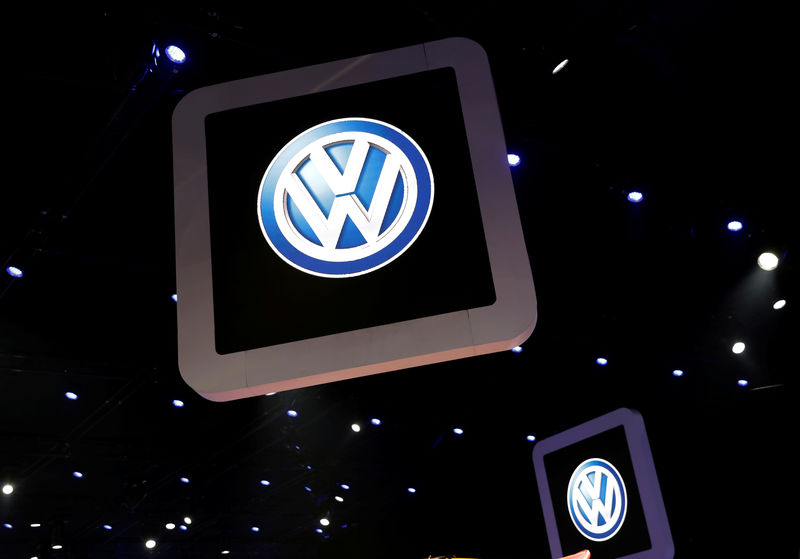By Paul Lienert, Norihiko Shirouzu and Edward Taylor
(Reuters) - Global automakers are planning a $300 billion surge in spending on electric vehicle technology over the next five to 10 years, with nearly half of the money targeted at China, accelerating the industry's transition from fossil fuels and shifting power to Asian battery and electric vehicle technology suppliers.
The unprecedented level of spending - much of it by Germany's Volkswagen AG (DE:VOWG_p) - is driven in large measure by government policies adopted to cut carbon dioxide emissions, and will extend technological advances that have improved battery cost, range and charging time to make electric vehicles more appealing to consumers, according to an exclusive Reuters analysis of public data released by those companies.
For a graphic showing planned EV spending by country, click on https://tmsnrt.rs/2Azl09N
China for decades played catch-up to German, Japanese and American automakers, which dominated internal combustion vehicle technology. Now, China is positioned to lead electric vehicle development, industry executives say.
"The future of Volkswagen will be decided in the Chinese market," said Herbert Diess, chief executive of VW, which has decades-old joint ventures with two of China's largest automakers, SAIC Motor (SS:600104) and FAW Car (SZ:000800).
Speaking earlier this week to a small group of reporters in Beijing, Diess said China "will become one of the automotive powerhouses in the world."
"What we find (in China) is really the right environment to develop the next generation of cars and we find the right skills, which we only partially have in Europe or other places," he said.
Diess added, "We have very clear policies established here in China. Policymakers and regulators are requiring" a shift to electric vehicles.
As China and other countries place more restrictions on conventional gasoline and diesel engines, auto companies have accelerated the shift to electrification. A year ago global automakers said they planned to spend $90 billion on electric vehicle development.
The $300 billion that automakers have earmarked to put electric vehicles into mass production in China, Europe and North America is greater than the economies of Egypt or Chile.
Almost one-third of the industry's EV spending total, about $91 billion, is being committed by the Volkswagen Group, which is aggressively trying to distance itself from the Dieselgate scandal, which has cost it billions in penalties and legal settlements.
VW's sweeping electrification plan envisions capacity on three continents to build up to 15 million electric vehicles by 2025, including 50 pure electric and 30 hybrid electric models. Eventually, VW plans to offer electrified versions of all 300 models in its 12-brand global portfolio, which includes Audi and Porsche.
VW’s staggering EV budget dwarfs that of its closest competitor, Germany’s Daimler AG (DE:DAIGn), which has committed $42 billion. In comparison, General Motors Co (N:GM), the No 1 U.S. automaker, has said it plans to spend a combined $8 billion on electric and self-driving vehicles.
Roughly 45 percent of the global industry's planned EV investment and procurement spending, more than $135 billion, will occur in China, which is heavily promoting the production and sale of electric vehicles through a system of government-mandated quotas, credits and incentives.
As a result, EV spending by major Chinese automakers from SAIC to Great Wall Motor (SS:601633) could be matched or even exceeded by multinational joint-venture partners such VW, Daimler and GM, as they dramatically expand their electric vehicle portfolios in China and ramp up battery purchases from Chinese suppliers.
Reuters analyzed investment and procurement budgets made public over the past two years by 29 of the world’s top automakers, based primarily in the United States, China, Japan, Korea, India, Germany and France. The figures do not reflect planned investments and purchases that have not yet been made public.
Actual spending by vehicle manufacturers on research and development, engineering, production tooling and procurement likely will be much higher. The analysis also does not include related spending by automotive suppliers, technology companies and large corporations in other industries, from energy and aerospace to electronics and telecommunications.
“There has been a rush” to invest in electric vehicles and batteries, said Alexandre Marian, AlixPartners managing director and co-author of a 2018 study that forecast total EV spending of $255 billion through 2023 by global automakers and suppliers.
Marian said the industry has increased spending budgets on electric vehicles and batteries, while seeking more alliances and partnerships to help spread the higher investment costs.
Alliances, such as those between VW and its Chinese partners, will be among the greatest spurs to innovation, especially in the global rollout of electric vehicles.

CEO Diess said VW is "evolving from the model where we have been developing and bringing European technology into this market to a new phase where we will co-develop part of the automotive technology in China for the rest of the world. I think this is a significant step change."